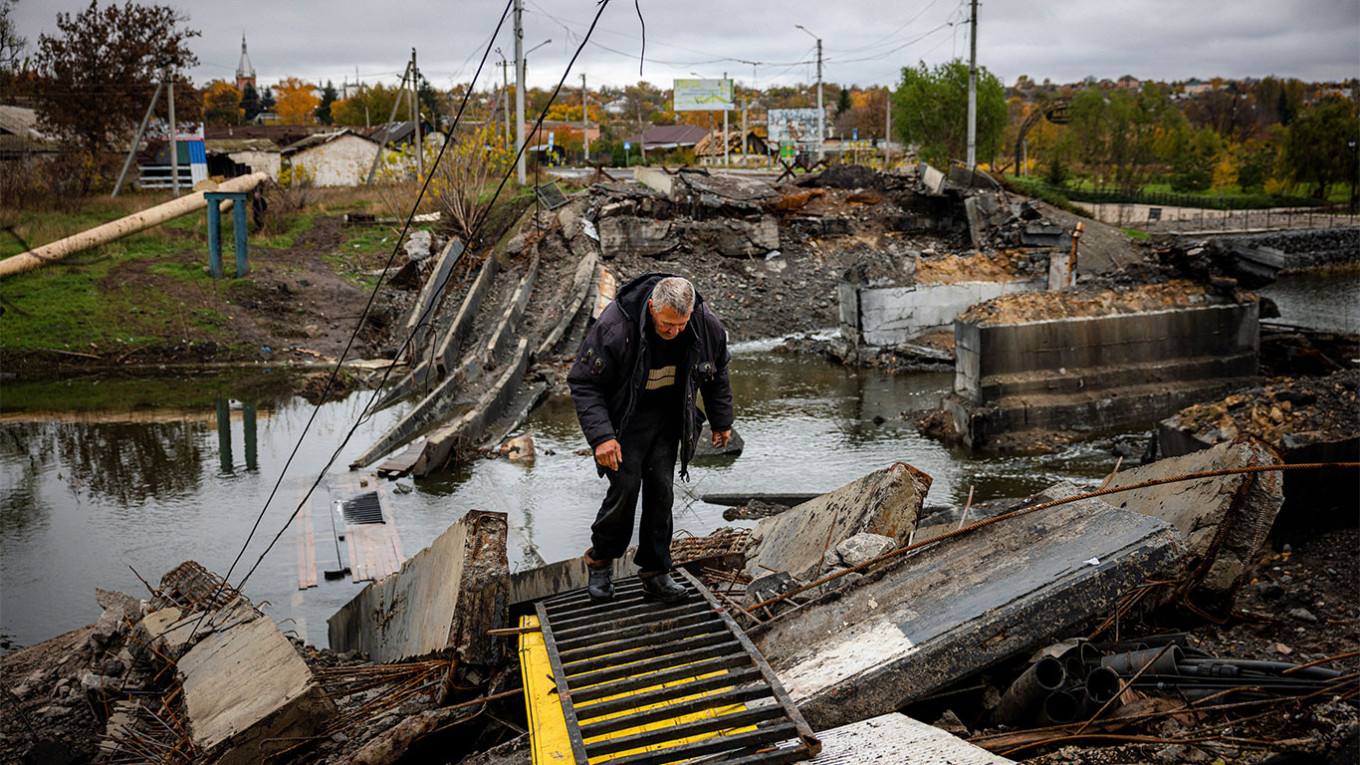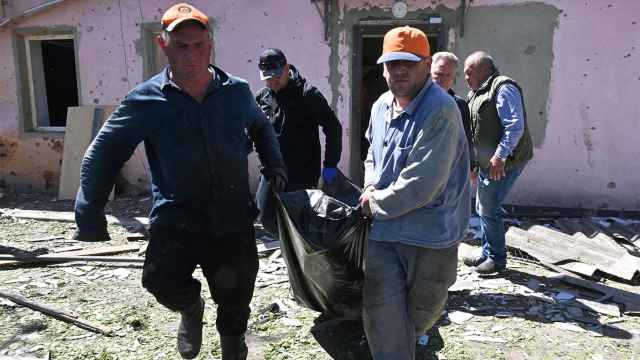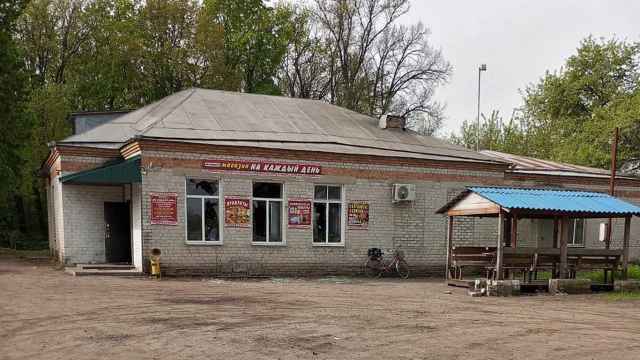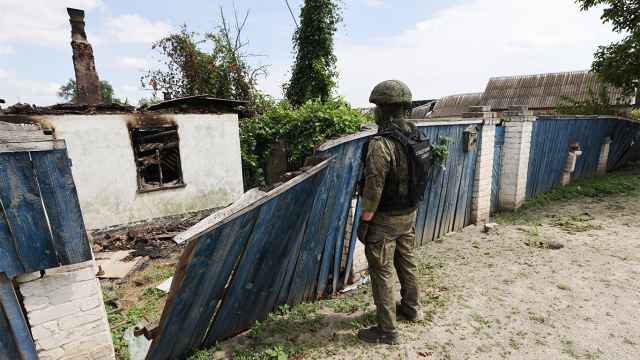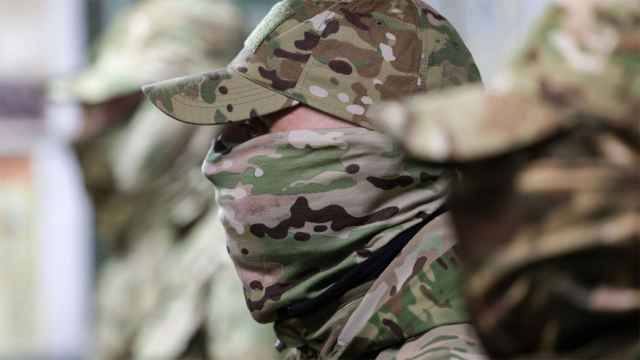The battle for the eastern Ukrainian city of Bakhmut has intensified as Russian troops led by the murky Wagner mercenary group relentlessly exchange artillery fire with Ukrainian forces in their attempt to seize the small but strategically important city.
The fighting, which has grown increasingly deadly in recent days, underscores Russia’s desperation to declare a win in its eight-month-long war as Ukraine’s counterattacks have all but brought its gains to a halt in the past month.
“The continuing attacks around Bakhmut reflect the desire of both the Russian military and the Kremlin for some good news after months of morale-sapping retreats in the face of successful Ukrainian counteroffensives,” James Black, a defense analyst at the U.S. Rand Corporation, told The Moscow Times.
Capturing Bakhmut, a salt mining city in the Donetsk region with a pre-war population of 70,000 people, would give Russia a key foothold to launch offensives toward major cities such as Sloviansk and Kramatorsk — and vindicate Moscow’s decision to throw thousands of men at the fight in the past month.
“Bakhmut is one of the few places where Russia has been going forward rather than backward since the summer,” Black said.
Ukraine’s forces have this week repelled two Russian offensives in the direction of Bakhmut from the city of Soledar 10 kilometers northeast of the city, as well as from the south near Ivanhrad, according to the Ukrainian General Staff.
The Wagner group, which has taken a central role in Russia’s offensives in recent months, is apparently spearheading Russia’s moves toward the city.
“Wagner’s units are moving forward every day,” said Yevgeny Prighozin, Wagner’s Kremlin-linked founder, in a press release published by his Concord catering firm.
The heavy fighting has knocked out water, gas and electricity supplies to Bakhmut, where scores of citizens remain despite an estimated 90% of the population fleeing in the wake of Russia’s full-scale invasion.
“Regrettably, my parents stayed there, and there has been no contact with them for more than two weeks,” one Bakhmut resident who wished to remain anonymous told The Moscow Times.
According to Russian pro-war bloggers, Moscow’s forces on Wednesday gained control of Zaitseve, a key settlement south of Bakhmut that is located on a major highway running to the city center.
But Russian forces are paying a heavy price for every meter gained.
“It’s a meat grinder,” Jakub Janovsky, a contributor to defense analysis website Oryx, which uses open-source intelligence to track Russian losses, told The Moscow Times.
In recent days, unverified video footage has shown scorched earth and volleys of Ukrainian artillery being unleashed across Russian positions northeast of Bakhmut. In another video, a captured Wagner mercenary is seen claiming that of the 50 men in his unit, just 12 remain.
Among those losses are men recently sent to Ukraine as part of Moscow’s “partial” mobilization, as well as Russian convicts recruited from prisons by Wagner — both efforts aimed at solving Moscow's manpower shortage in Ukraine.
“I’m a trained actor, I’ve done over 20 films,” said one Wagner soldier on the outskirts of Bakhmut in a report aired on Russian state broadcaster Channel One on Thursday. “I probably ended up here because I’m a warrior…[These] are people who chose to become warriors.”
However, reports suggest that Russia is deploying its glut of new personnel recklessly in many cases. One Ukrainian soldier claimed that Russian recruits are ordered to approach Kyiv’s positions in a deliberate tactic to engage Ukrainian troops and to scope out their positions.
"Their job is to advance towards us, forcing us to fire on them, to reveal our positions," Sergiy, a major in the 53rd brigade, told AFP.
Ukrainian President Volodymyr Zelensky said these tactics reflect the “craziness” of Russia’s command in their unrelenting efforts to take Bakhmut.
“Day after day, for months, they are driving people to their deaths there, concentrating the highest level of artillery strikes," Zelensky said in his nightly address Thursday.
And with winter looming, Russia needs to act quickly if it is to deliver a domestic morale boost by taking Bakhmut, said Rand Corporation analyst Black.
“Historical experience suggests that the onset of winter is also likely to have a significant impact on military operations in the coming weeks and months, as a combination of mud, freezing temperatures and snow settles in.”
A Message from The Moscow Times:
Dear readers,
We are facing unprecedented challenges. Russia's Prosecutor General's Office has designated The Moscow Times as an "undesirable" organization, criminalizing our work and putting our staff at risk of prosecution. This follows our earlier unjust labeling as a "foreign agent."
These actions are direct attempts to silence independent journalism in Russia. The authorities claim our work "discredits the decisions of the Russian leadership." We see things differently: we strive to provide accurate, unbiased reporting on Russia.
We, the journalists of The Moscow Times, refuse to be silenced. But to continue our work, we need your help.
Your support, no matter how small, makes a world of difference. If you can, please support us monthly starting from just $2. It's quick to set up, and every contribution makes a significant impact.
By supporting The Moscow Times, you're defending open, independent journalism in the face of repression. Thank you for standing with us.
Remind me later.



